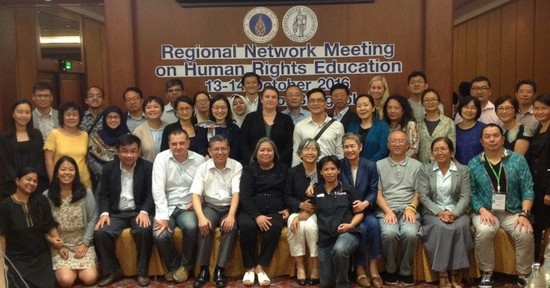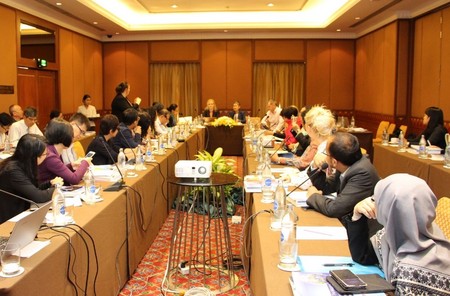- TOP
- 資料館
- FOCUS
- December 2016 - Volume 86
- Human Rights Education: The Need for Networking
FOCUS December 2016 Volume 86
Human Rights Education: The Need for Networking
The landmark Regional Network Meeting on Human Rights Education was held in Bangkok on 13-14 October 2016. The event, the first of its kind, was co-organized by the Institute of Human Rights and Peace Studies (IHRP), Mahidol University in Thailand, the Norwegian Centre for Human Rights (NCHR), the Danish Institute for Human Rights (DIHR) and Raoul Wallenberg Institute for Human Rights and Humanitarian Law (RWI) in Sweden. The meeting brought together scholars from Northeast and Southeast Asia (China, Japan, Mongolia, Republic of Korea, Taiwan, Cambodia, Indonesia, Malaysia, the Philippines, Thailand, Timor Leste and Vietnam) who shared their respective experiences. The participation of colleagues from Denmark, Norway, and Sweden was meaningful as it contributed to understanding the different contexts of running human rights education. The very objectives of this very first meeting were two-fold: to contribute to the further development of human rights education through an information exchange on how it has been conducted in neighboring countries in order to support a broader regional cooperation on human rights education and research; and to provide another platform for further regional contact and possible exchanges between the two subregions. The discussions focused on the review of the development of human rights education in the two subregions as well as at the current state of curriculums and textbooks and the possibilities for strengthening future cooperation.
Contextualizing Human Rights Education in Northeast and Southeast Asia
Despite the improvement of human rights promotion in Southeast Asia over the past decades, protection of human rights has always been problematic. Academics and civil society in the subregion see a causal relationship between promotion and protection of human rights and human rights awareness and education. They also believe that it is not enough to include concepts and discourses on human rights, peace, democracy, rule of law and justice in national constitutions and/or the ASEAN Charter and other relevant documents; promotion of human rights and peace is essential in ensuring that all these grand concepts are realized. With the advent of the ASEAN Intergovernmental Commission on Human Rights (AICHR) and ASEAN Commission for Women and Children (ACWC), and the emergence of national human rights institutions, there was an expectation that they would contribute to better promotion and protection of human rights in the subregion. But that has not been the case. Seven years since establishment, no notable progress has been recorded. Moreover, human rights and peace continue to be threatened in Southeast Asia.
It is noted that some progress made in Southeast Asia/ASEAN has not yet been properly reflected in education and research. As noted by a group of academics in the subregion:1
Human rights and peace studies and research in SEA [Southeast Asia] are still at a basic level, which means that moving towards the promotion of human rights and peace will not be without challenges. One of the most effective and sustainable ways to move towards human rights and peace is through the promotion and strengthening of education and research.
In 2016, Strengthening Human Rights and Peace Education in ASEAN/Southeast Asia (SHAPE-SEA) found that while “there are universities with established degrees, and courses on human rights and peace at a number of universities in the region, human rights and peace research and education is still not widespread, and as a result, very few students in the region graduate with any knowledge in these fields.”2
One of the challenges identified by SHAPE-SEA affecting the development of education and research on human rights is the fact that human rights are; 3
still an academically contested concept, with different interpretations in different societies. Although some Southeast Asian countries (and those members of ASEAN in particular) are moving towards greater compliance to human rights, and also to related standards such as democracy and peace, others are not yet ready for such reforms. Higher education is still in the early development phase and many universities do not have academics capable of teaching or researching human rights. On top of this, there are still political challenges to discussing human rights in some ASEAN countries. More or less similar challenges also apply to peace studies [that] would have to be properly addressed and developed.
Compared to Northeast Asia, subregional academic cooperation on human rights education in Southeast Asia is more institutionalized, either through the Southeast Asian Human Rights Studies Network (SEAHRN) and/or the ASEAN University Network – Human Rights Education (AUN-HRE). The Northeast Asian (NEA) subregion lacks similar sustainable and broad ranging initiatives. “NEA includes countries with very distinct political, social and economic contexts and is struggling with a lack of mutual trust. Also, there is no overarching regional architecture similar to ASEAN. The lack of regional cooperation is felt also in the academic sector” said a colleague from the NCHR. It was further pointed out that in the case of China where many universities were offering human rights programs, “Chinese human rights academics have limited contact and cooperation with academic colleagues from the region.”4
Indeed, the discussions during the two-day meeting reflected such observations. In Northeast Asia, political imperative seems to play very important roles in shaping human rights education as well as limiting space for academic freedom. In some countries, free sources for materials such as google were not allowed and government policies including local authorities tend to be hindering any initiatives made by academics. Therefore, despite some progress, human rights education at higher education institutions in Southeast Asia still faced the challenge of limited academic space. In most of the participating countries, academic freedom seems to be an issue. Efforts to offer human rights or peace programs at the university level by progressive scholars are still subject to university administrative scrutiny which in turn is subject to political authority.
Possible Cooperation and Partnership
Desire for further strengthening the cross-sub-regional cooperation was clearly expressed by all participants at the regional network meeting. Colleagues from Northeast Asia, without exception, were eager to continue discussions and sharing. Friends from Scandinavian countries were willing to continue their support. For most, if not all Southeast Asian academics, the meeting was the first time for them to appreciate both progress made and challenges faced by Northeast Asian comrades. Some activities were identified as possible areas for cooperation and partnership, namely;
1. Sharing of curriculums and syllabuses as well as materials by making them available on their respective institution’s website;
2. Exchange/visit of guest lecturers - this is possible both under bilateral arrangements or multilateral framework such as ASEAN plus 3;
3. Sharing expertise in particular areas of research and interest - which can be further developed into cross-sub-regional joint research projects;
4. On top of participating in the bi-annual SEAHRN International Conference, a regular platform for interactive and substantive discussions between Northeast and Southeast Asian scholars involved in human rights education should be created;
5. Institutionalizing a platform through collaborative cross-sub-regional human rights curriculum, the same way the EU Masters in Human Rights and Democratization has been run by European universities.
We believe that for human rights education to flourish there is a need for strong will to pave the way for cooperation. Lack of academic freedom can be overcome if we all fight for it, and that will always be a first step towards closer collaboration. Ways forward were already identified, now it is time to take the first step.
Sriprapha Petcharamesree, PhD, is the Chair/Lecturer of the PhD program of the Institute of Human Rights and Peace Studies, Mahidol University. She is also the Convener of the ASEAN University Network–Human Rights Education.
For further information, please contact the Institute of Human Rights and Peace Studies, Panyaphiphat Building, Mahidol University, 999 Phuttamonthon 4 Rd., Salaya, Nakhon Pathom 73170, Thailand; ph (66)
2-441-0813-5; fax (66) 2-441-0872-3; ihrpoutreach@mahidol.ac.th; ihrpma@mahidol.ac.th; ihrpphd@mahidol.ac.th; www.ihrp.mahidol.ac.th/.
Endnotes
1 IHRP, Strengthening Human Rights and Peace Research and Education in Southeast Asia/ASEAN, Project proposal prepared by AUN-HRE and SEAHRN, October 2014.
2 Ibid.
4 NCHR, Regional Network Meeting, Project proposal prepared by NCHR, August 2015.


